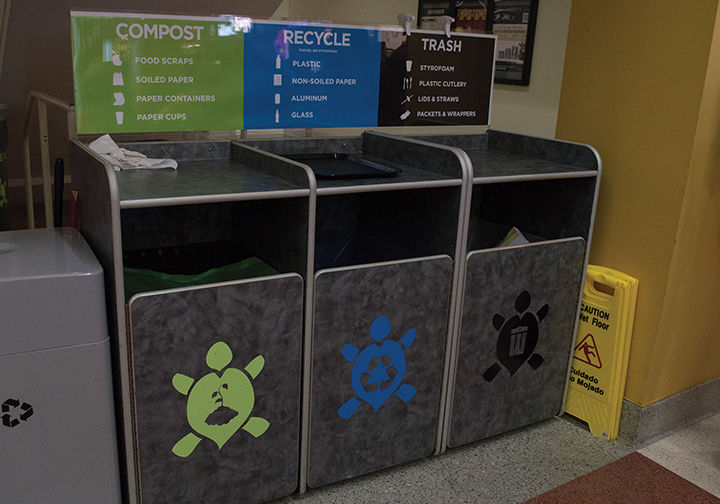
Bins in Stamp Student Union sort compost, recyclables and trash.
As Dining Services considers significant changes to anytime dining for next fall, it also plans to replace recyclable and waste items with compostable products by next year.
This change is in line with a larger University of Maryland initiative to reduce waste and limit contamination of compost and would help Dining Services slightly reduce costs, said Allison Lilly, Dining Services’ sustainability and wellness coordinator.
“Essentially, everything that’s going to be in the dining halls, with maybe some very limited exceptions, is going to be compostable,” Lilly said. “There’s really not going to be any reason where students will have to worry about sorting that material.”
READ MORE: Composting to expand to Easton, Chestertown halls this semester
To do this, Dining Services will make more compostable plastic bags available and reduce using plastic carryout containers and other plastics that can be trashed, Lilly said. It will also put more emphasis on reusable OZZI containers.
Lilly said Dining Services has struggled to get students to properly sort their disposable products among trash, recycling and compost.
While it’s easy for the staff to sort the products if they are placed on the tray lines, Dining Services spokesman Bart Hipple said it’s much more difficult to properly sort the waste after the fact when students dispose of products incorrectly at the sorting stations.
READ MORE: UMD College Park Scholars program targets campus waste management
“We do not have the manpower to go through bags of anything, item by item, and resort them,” Hipple said. “Sometimes, bags that were intended for recycling and composting have to be put in the trash.”
Dining Services collects all of its compost in a compactor. If the compactor is taken to a composting facility and there is too much contamination, Lilly said the facility will reject the load, which then has to be taken to a landfill.
To avoid this, Dining Services plans on minimizing the complexity of products available, which would simplify the process for students.
During a waste audit last spring, Dining Services found it had 89 percent acceptable compostable materials in its composting bags, which left for 10 percent contamination.
“We’ve done a pretty good job over the past few years in really reducing the number of items that are landfill trash in our dining rooms,” she said. “[But] if our students don’t understand which is which, it may as well all be trash because it all gets mixed up together.”
Stamp Student Union deals with similar problems and seeks to decrease contamination in both composting and recycling.
A waste audit from earlier in the semester found that 86.7 percent of materials found in Stamp compost bins were compostable, as opposed to only 47.2 percent of recyclable materials found in recycling bins.
While the purity of the recycling stream has improved slightly since last year, Stamp found that food, primarily from SaladWorks, liquid from the inside plastic bottles and small items like plastic utensils heavily contaminate the recycling bins.
“We have seen great results from our waste audits that make us think that our students and visitor are really starting to get it, but Stamp and our partners are always working hard to get a consistent message out,” said Dan Wray, Stamp assistant director for facilities.
Dining Services is working with Stamp and the Office of Sustainability to push for more composting on the campus.
“We hope that eventually it will become second nature,” Wray said. “We know that for people to really, fully get it, it’s going to take a bit of a culture shift and it’s got to be intentional.”



